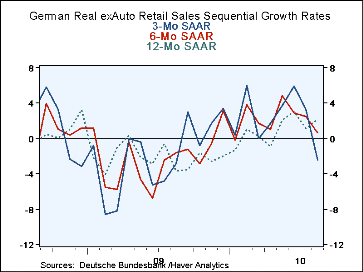 Global| Oct 01 2010
Global| Oct 01 2010German Retail Sales Tick Back Into The Plus Column
Summary
German retail sales ticked up ex-autos in August after two moths of sliding. Real ex-auto retail sales fell in August for the second month in a row. By category nominal retail sales are up for food and clothing and footwear over [...]
 German retail sales ticked up ex-autos in August after two moths of sliding. Real ex-auto retail sales fell in August for
the second month in a row. By category nominal retail sales are up for food and clothing and footwear over three-months while
Ex auto and car registrations indicators are slumping over three-months.
German retail sales ticked up ex-autos in August after two moths of sliding. Real ex-auto retail sales fell in August for
the second month in a row. By category nominal retail sales are up for food and clothing and footwear over three-months while
Ex auto and car registrations indicators are slumping over three-months.
The chart on real ex auto retail sales shows that until the last few months German retailing was in an upswing. Indeed the recent EU Commission indicators on German retailing and consumer confidence which are updated through September show that there continues to be some progress. But the hard data themselves on what consumers are doing show that there has been a slump after a long stretch of slow improvement – least as of August. This is despite that more recent survey data that says the opposite positive trend is still in train. What are we to believe? On what set of 'facts' are policymakers to base policy?
Obviously economic trends in the Zone are in a quandary. The recent employment statistics point out the huge gaps in unemployment among states in the Zone. Not only is intra-zone heterogeneity a problem for policy but the fact that it is hard to pin down trends in individual countries adds to the mix of uncertainty and deepens the ECB's conundrum.
Germany is an example. It has been the leading economy in recovery and it is Europe's largest economy. Its strong growth has been export-led and the recovery was finally pulling up the German retail sector. Now, all that progress may be in flux.
We have not heard the kind of policy angst from the ECB that we have heard from the UK and US central banks over whether to do more to help the recovery along. Germany has opted for fiscal austerity. The UK opted for fiscal austerity but the BOE has some special easing programs in place. In the US fiscal policy remains lax. Some added stimulus has been undertaken. More action is pondered. No fiscal restraint in the future has been promised as an offset. The Fed has embarked on a quantitative easing program which is being held in suspension and the Fed is on the brink of doing more on the grounds that inflation is too low.
The stronger social safety net and more limited damage done to consumers in the recession is one reason for Europe being less pressured to do more. But with Ireland's huge set back to its banking sector and Spain's recent downgrade, the ECB may yet find that it too is in a difficult policy bind. Exporting to the US cannot remain a viable European growth strategy although the recent spike up indicated in China will be helpful. The policy picture remains in flux.
| German Real and Nominal Retail Sales | ||||||||
|---|---|---|---|---|---|---|---|---|
| Nominal | Aug-10 | Jul-10 | Jun-10 | 3-MO | 6-MO | 12-MO | YrAgo | QTR Saar |
| Retaill Ex auto | 0.1% | -0.3% | -0.2% | -1.6% | 2.8% | 3.3% | -4.7% | -0.1% |
| MV and Parts | -0.2% | -0.4% | 0.0% | -2.4% | 0.6% | 2.2% | -3.6% | -0.5% |
| Food Bev & Tobacco | 0.5% | 0.4% | -0.3% | 2.4% | 3.7% | -0.4% | -0.9% | 6.4% |
| Clothing footwear | 1.3% | -0.8% | 3.7% | 17.8% | 8.8% | 8.8% | -5.9% | 13.5% |
| car registrations (units) | -3.5% | 1.4% | 0.8% | -5.4% | -14.2% | -30.3% | 28.9% | 0.0% |
| Real | ||||||||
| Retail Ex auto | -0.2% | -0.4% | 0.0% | -2.4% | 0.6% | 2.2% | -3.6% | -0.5% |
Robert Brusca
AuthorMore in Author Profile »Robert A. Brusca is Chief Economist of Fact and Opinion Economics, a consulting firm he founded in Manhattan. He has been an economist on Wall Street for over 25 years. He has visited central banking and large institutional clients in over 30 countries in his career as an economist. Mr. Brusca was a Divisional Research Chief at the Federal Reserve Bank of NY (Chief of the International Financial markets Division), a Fed Watcher at Irving Trust and Chief Economist at Nikko Securities International. He is widely quoted and appears in various media. Mr. Brusca holds an MA and Ph.D. in economics from Michigan State University and a BA in Economics from the University of Michigan. His research pursues his strong interests in non aligned policy economics as well as international economics. FAO Economics’ research targets investors to assist them in making better investment decisions in stocks, bonds and in a variety of international assets. The company does not manage money and has no conflicts in giving economic advice.
More Economy in Brief
 Global| Feb 05 2026
Global| Feb 05 2026Charts of the Week: Balanced Policy, Resilient Data and AI Narratives
by:Andrew Cates






